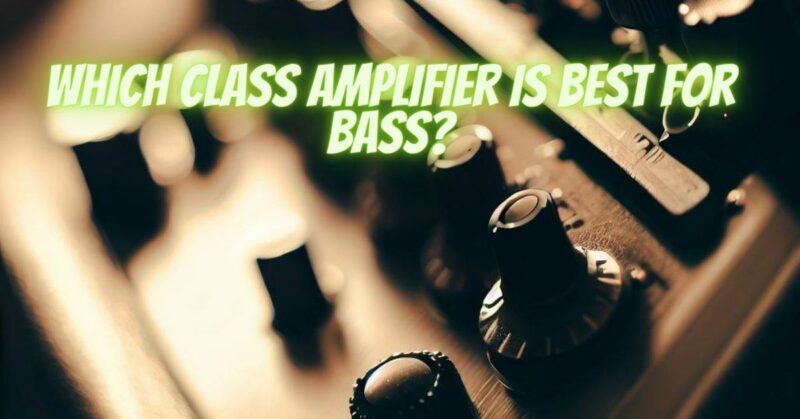When it comes to achieving optimal sound quality for your bass guitar or home audio system, selecting the right amplifier class is paramount. Different amplifier classes offer distinct characteristics that can significantly impact bass performance and overall sound quality. In this article, we will explore the factors to consider when choosing the ideal amplifier class for bass, ensuring you achieve the rich, powerful bass tones you desire.
Understanding Amplifier Classes
Amplifier classes are categorized based on their internal circuitry and operation. The main amplifier classes relevant to bass applications are Class A, Class AB, Class D, and Class H. Each class has its own strengths and weaknesses, making it important to choose one that aligns with your bass performance goals.
1. Class A Amplifiers
- Characteristics: Class A amplifiers operate in a “full-on” mode at all times, providing continuous amplification. They are known for their exceptional linearity and low distortion.
- Advantages for Bass: Class A amplifiers offer pristine audio quality with minimal distortion, making them ideal for capturing the subtleties and nuances of bass guitar tones.
- Limitations: Class A amplifiers are relatively inefficient and generate significant heat. They are less commonly used in high-powered bass applications due to their lower efficiency.
2. Class AB Amplifiers
- Characteristics: Class AB amplifiers combine the characteristics of both Class A and Class B operation. They use two sets of transistors—one for positive half-cycles and one for negative half-cycles of the input signal.
- Advantages for Bass: Class AB amplifiers offer a balance between efficiency and sound quality, making them a popular choice for bass guitar amplification. They provide good fidelity and can handle high power.
- Limitations: Class AB amplifiers can generate heat, especially at high power levels, but are generally more efficient than Class A.
3. Class D Amplifiers
- Characteristics: Class D amplifiers, also known as digital or “switching” amplifiers, use pulse-width modulation (PWM) to recreate audio signals. They rapidly switch the output transistors on and off.
- Advantages for Bass: Class D amplifiers are highly efficient and generate minimal heat. They are well-suited for high-powered bass amplification, making them popular in modern bass amplifiers and subwoofers.
- Limitations: Some audiophiles argue that Class D amplifiers may not match the sonic purity of Class A or Class AB amplifiers, particularly at high frequencies.
4. Class H Amplifiers
- Characteristics: Class H amplifiers are a variation of Class AB amplifiers with a dynamic power supply. The power supply voltage adjusts based on the input signal, allowing for improved efficiency.
- Advantages for Bass: Class H amplifiers combine the sound quality benefits of Class AB with improved efficiency. They are suitable for high-powered bass applications.
- Limitations: Class H amplifiers can be more complex and expensive to design and manufacture than other classes.
Choosing the Right Amplifier Class for Bass
To select the ideal amplifier class for bass, consider the following factors:
- Power Requirements: Assess the power needs of your bass setup. If you require high power output and efficiency, Class AB, Class D, or Class H amplifiers are suitable choices.
- Sound Preferences: Consider your sonic preferences. If you prioritize accuracy and audiophile-grade sound quality, Class A or Class AB amplifiers may be preferable. Class D amplifiers can provide high power without sacrificing too much sound quality.
- Budget: Your budget plays a role in amplifier selection. Class A and Class AB amplifiers may be more expensive due to their high-quality components and construction. Class D and Class H amplifiers offer a range of options for different budgets.
- Bass Style and Genre: Think about the style and genre of music you play. If you need tight, punchy bass for genres like rock or metal, an amplifier with good transient response is crucial. Class D and Class H amplifiers often excel in this regard.
Selecting the right amplifier class for bass is essential to achieve optimal sound quality and performance. By carefully evaluating your power requirements, sound preferences, budget, and the style of music you play, you can make an informed decision to enhance your bass playing or listening experience. Whether you prioritize pristine sound quality, efficiency, or a balance between the two, there’s an amplifier class that suits your specific needs and allows you to enjoy the deep, powerful bass tones that make your music come alive.


